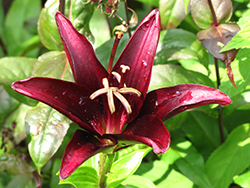>> Home
Height: 3 feet
Spacing: 18 inches
Sunlight:
![]()
![]()
Hardiness Zone: 3a
Group/Class: Asiatic Lily
Description:
An easy to grow and pollinator friendly variety presenting dramatic dark purple, almost black blooms rising above medium green foliage; adds mystery to early summer garden beds, borders and fresh cut arrangements; good containers quality
Ornamental Features
Landini Lily features bold burgundy trumpet-shaped flowers with deep purple overtones at the ends of the stems in early summer. The flowers are excellent for cutting. Its narrow leaves remain green in colour throughout the season.
Landscape Attributes
Landini Lily is an herbaceous perennial with a rigidly upright and towering form. Its medium texture blends into the garden, but can always be balanced by a couple of finer or coarser plants for an effective composition.
This plant will require occasional maintenance and upkeep, and should be cut back in late fall in preparation for winter. It is a good choice for attracting bees, butterflies and hummingbirds to your yard. Gardeners should be aware of the following characteristic(s) that may warrant special consideration;
- Insects
- Disease
Landini Lily is recommended for the following landscape applications;
- Mass Planting
- Border Edging
- General Garden Use
- Container Planting
Planting & Growing
Landini Lily will grow to be about 30 inches tall at maturity, with a spread of 24 inches. When grown in masses or used as a bedding plant, individual plants should be spaced approximately 18 inches apart. It tends to be leggy, with a typical clearance of 1 foot from the ground, and should be underplanted with lower-growing perennials. It grows at a fast rate, and under ideal conditions can be expected to live for approximately 10 years. As an herbaceous perennial, this plant will usually die back to the crown each winter, and will regrow from the base each spring. Be careful not to disturb the crown in late winter when it may not be readily seen!
This plant does best in full sun to partial shade. You may want to keep it away from hot, dry locations that receive direct afternoon sun or which get reflected sunlight, such as against the south side of a white wall. It does best in average to evenly moist conditions, but will not tolerate standing water. This plant should not require much in the way of fertilizing once established, although it may appreciate a shot of general-purpose fertilizer from time to time early in the growing season. It is not particular as to soil type or pH. It is somewhat tolerant of urban pollution. This particular variety is an interspecific hybrid. It can be propagated by multiplication of the underground bulbs; however, as a cultivated variety, be aware that it may be subject to certain restrictions or prohibitions on propagation.
Landini Lily is a fine choice for the garden, but it is also a good selection for planting in outdoor pots and containers. With its upright habit of growth, it is best suited for use as a 'thriller' in the 'spiller-thriller-filler' container combination; plant it near the center of the pot, surrounded by smaller plants and those that spill over the edges. It is even sizeable enough that it can be grown alone in a suitable container. Note that when growing plants in outdoor containers and baskets, they may require more frequent waterings than they would in the yard or garden. Be aware that in our climate, most plants cannot be expected to survive the winter if left in containers outdoors, and this plant is no exception. Contact our experts for more information on how to protect it over the winter months.

